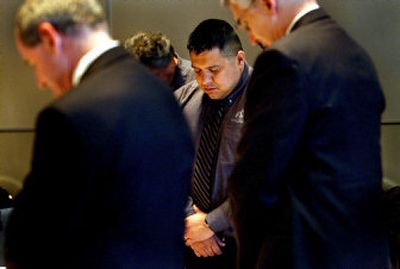Tribes, Risch clash over gas tax

A testy meeting Wednesday between Idaho’s acting governor and representatives of the state’s Native American tribes failed to yield anything but promises of progress on the fate of nearly $3.5 million in annual tribal gas tax revenues.
Indian leaders agreed only to negotiate individually – and privately – with Lt. Gov. Jim Risch to determine whether they will voluntarily concede some share of fuel revenues previously guaranteed by courts.
They remained divided, however, on basic issues such as the amount, collection and allocation of the taxes, as well as how the money might be spent.
“I need the state to throw something on the table. I need a starting point. I don’t want to negotiate with myself,” said Chief Allan, chairman of the Coeur d’Alene Tribe. “The big issue is how they’re divvying it up.”
That attitude was a far cry from the sweeping consensus outlined by Risch at the start of the three-hour meeting. The acting governor traveled to Coeur d’Alene hoping to negotiate a settlement that would forestall future legislation aimed at seizing the revenues – and the litigation that almost certainly would follow.
In a multipoint plan, Risch proposed that the tribes agree to a master settlement that would levy fuel taxes at the same rate as the state – now 25 cents a gallon. He suggested the tribes allow the state to collect the taxes at the wholesale rather than the retail level and to repay the tribes for their share. He asked that the tribes help the state meet requirements of the International Fuel Tax Agreement, which reimburses interstate truckers for diesel fuel.
Risch obliquely suggested that the state and the tribes might split the gas tax proceeds, with half going to each side.
Tribal members balked at nearly all of Risch’s suggestions, including the suggestion of a 50-50 split.
“It wouldn’t be worth it on either side,” said Allan, whose tribe could lose up to $500,000 in gas tax revenue each year. “We’re not getting rich off the fuel tax.”
At one time, at least some of Idaho’s tribes paid the gas tax to the state for reservation gas sold to nontribal members, but the state tax commission tried to gain access to tax money on sales to tribal members as well. The case went to court, and the state lost, with the Idaho Supreme Court ruling that the state can’t tax tribal gas sales on the reservation. On appeal, the 9th U.S. Circuit Court of Appeals ruled against the state as well.
However, a recent U.S. Supreme Court decision in Kansas upheld Idaho’s position that the state has a right to the taxes, a move that led local lawmakers to try to recoup the revenues in the recently concluded session. House Bill 661 aimed to seize the nearly $3.5 million in tribal revenues, a fraction of the $217 million in gas taxes raised in Idaho in 2005, according to the state tax commission. HB 661 was defeated on a tie vote in committee.
Samuel Penney, who represents the Nez Perce tribe, said he didn’t come to Wednesday’s meeting prepared to negotiate. Instead, he said, he needed more time to study the state’s proposals.
That appeared to frustrate Risch, who warned that failure to negotiate a settlement would lead to more legislation like HB 661. The U.S. Supreme Court ruling makes it more likely that the tribes will lose all of their fuel funds in the future, he added.
“I’m disappointed coming here, to say the least. My involvement here is premature,” said Risch, who said that the tribes shouldn’t expect future legislators to grant more time for negotiation. “The legislators will say, ‘I understand the governor took a day out of his schedule and got nowhere.’ ”
Penney said it’s too early to dismiss the possibility of progress.
“I’ve never heard this stuff before,” he said. “You’re saying we might as well give up on this process today. It’s the first meeting.”
Tribal members, including Nancy Murillo of the Shoshone-Bannocks, agreed that a settlement might be possible, but not a one-size-fits-all agreement. Instead, the tribes plan to meet individually, in private, with the acting governor or his designated representative. Details of those negotiations will be revealed at the June 6 meeting of the Council on Indian Affairs.
Under the state Tribal Relations Act, the governor can “cut a deal” with the tribes, Risch said. The deals are subject to legislative approval, but even that potentially rocky process might be better than protracted – and expensive – litigation, he said.
Like the other tribal leaders, Murillo said she was open to crafting a solution, even if the process is difficult.
“My arm hurts, though,” she said in mock pain. “I feel like my arm’s been twisted.”